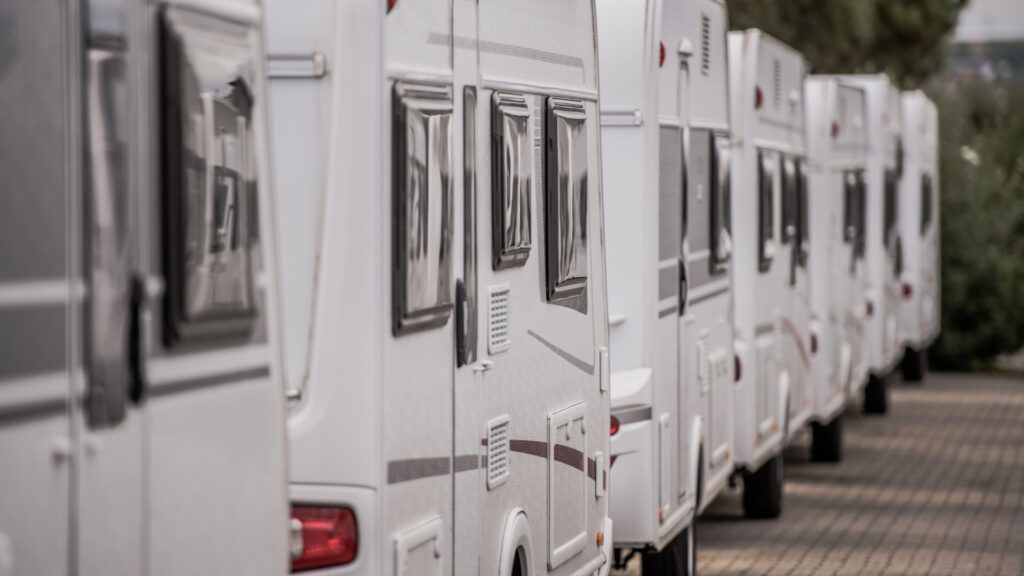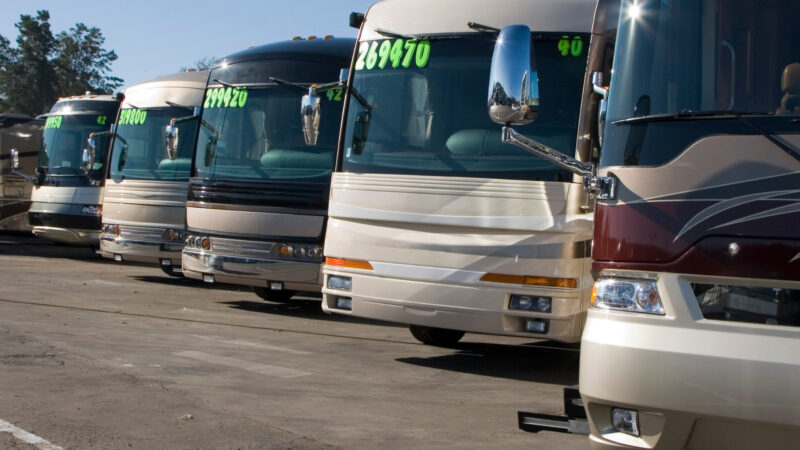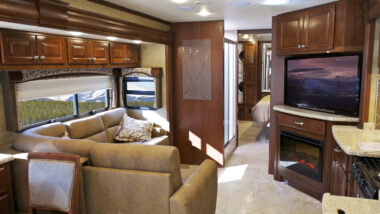Table of Contents Show
While we’re not looking to jump into a new RV anytime soon, we know many of you are. We recently had the opportunity to walk through some of the latest and greatest RVs on the market.
However, we quickly noticed that the physical length and the list of amenities aren’t the only things growing on many RVs. Sadly, the MSRPs for new units are also drastically increasing.
So why are RV MSRPs so inflated in 2023? Let’s dive in and see what the fuss is all about!
What Is MSRP?
MSRP stands for Manufacturer’s Suggested Retail Price, which is the price recommended by the manufacturer for a product.
It serves as the base cost before any discounts or markups a dealer or retailer may offer. It serves as a guide for retailers when setting the price at which they will sell the product to consumers.
Retailers often sell products for less than the MSRP, and consumers may negotiate a lower price as well.
Additionally, competing retailers may set different prices for the same product depending on various factors. They often consider the location, competition, and supply and demand.
RVs Don’t Have the Same Window Sticker Standards as Cars
A “Monroney” is a vehicle’s window sticker. These stickers are one of the first things a consumer looks at when shopping for a new car.
A Monroney lists tons of information about the vehicle, including a breakdown of the features and the MSRP.
Unfortunately, this is another example of how RVs are treated differently than passenger vehicles. Auto dealers are required by law to display the Monroney of a vehicle, but RV dealers do not. If you’ve seen a sticker that looks like a Monroney on an RV, the numbers you’re seeing are set at the dealership.
Yes, you read that correctly. The dealership can change and adjust these numbers as they wish. Dealerships will change these prices based on their supply, demand, and other factors.
Do RV Dealers Markup New RVs?
All dealerships are businesses. To stay in business, they must sell RVs for more than they paid.
The markup, also known as the “dealer profit,” is the difference between the cost of the vehicle to the dealership and the price at which it gets sold to the customer.
This markup helps dealerships cover their operating costs and make a profit. The amount of the markup can vary depending on several factors, including the make and model of the RV, local market conditions, and the dealership’s operating costs.
In some cases, RV dealerships may also offer discounts and incentives to customers, reducing the final price below the original markup.
3 Reasons MSRPs Are High
There are several reasons why we’ve seen an increase in MSRPs in recent years. Let’s look at a few of the most common reasons we see extremely high prices.
Increase in Demand
If you haven’t noticed, there’s been a massive increase in demand over the past several years for both new and used RVs. As with most wickedly popular products, it doesn’t have to stay that way for long before we see a price increase.
Retailers and manufacturers will take advantage of the situation and put every penny they can in their pockets.
Low interest rates also drove the increase in demand. Additionally, many people had an increased desire to get outdoors and travel, especially after the chaos of 2020 and 2021. While RVing was gaining in popularity before the chaos, it exploded in popularity during it.
Supply Shortages
The increased demand caused a massive supply shortage for RVs across the country. Dealerships, normally packed with rigs, had little to no inventory. Many consumers were purchasing RVs that were months away from entering production.
You don’t have to have an economics degree to understand the law of supply and demand. Low supply and high demand create a perfect storm that rains down extremely high MSRPs.
However, consumers bitten by the travel bug and with money burning a hole in their pockets will pay premium prices, which continues to drive up MSRPs.
Production Costs
As with many things, production costs for RVs have increased across the board. With inflation out of control, manufacturers pay premium wages to experienced workers to keep them on board.
In addition, shipping costs on all of their products have greatly increased, which doesn’t help the situation. These two major factors combine to increase production costs drastically.
Unfortunately, the only way for manufacturers to recoup these costs is to pass them on to dealerships, who then pass them on to consumers.
No matter the cause, increased MSRPs create a funnel that typically ends with the consumer taking the biggest hit.

Can You Negotiate the Price of an RV?
Despite what a dealership’s sales staff might want you to think, the price of an RV is negotiable. Depending on how badly a dealer wants to sell a rig, most are often willing to make deals to close a sale.
To negotiate effectively, do your research ahead of time and clearly understand the market value of the RV you’re interested in and any incentives or promotions the dealer may offer.
You can also negotiate on financing, trade-in offers, and any additional products or services you may want to add to your purchase. It’s always a good idea to be polite, firm, and respectful when negotiating.
Ultimately, you need to be prepared to walk away if you don’t get the deal you’re looking for.
How Much Off of MSRP Should I Pay for an RV?
In a typical RV market, consumers can expect dealers to take between 20% and 30% off the MSRP.
We got 29% off when we purchased our massive fifth wheel in 2017. However, as you’ve likely seen, the past several years have been anything but normal.
While we’re starting to see some deals returning to the 10% to 20% range, very few have gone back to offering 30%.
During the peak of the pandemic, RVs were selling insanely fast; dealerships had zero reasons to take anything off MSRP. As a result, many consumers paid tens of thousands of dollars more for their RV.
How much you can take off MSRP greatly depends on the current RV market. If you play your cards right, you can get that new RV reasonably priced.
Tips for Negotiating Your RV Price
Any time you make a large purchase, it doesn’t hurt to brush up on your negotiation skills. The better you negotiate, the better deal you’ll likely get. Let’s look at a few tips for negotiating the price of your next RV.
Know Your Stuff
As with any negotiation, you need to have some knowledge if you want to get a good deal. Don’t rush into purchasing your rig without taking the time to do your research. If you do, you’ll likely make a salesman’s eyes light up and help fund their next exotic vacation.
It can take weeks and months to understand the market. While the process for buying cars and RVs is similar, the knowledge you need is entirely different.
You need to know what you need in an RV for it to work for you and your family in your unique situation. We suggest you avoid stepping onto any dealership sales lot until you know this.
Shop at the Right Time
The time of year is a major factor when negotiating your deal. If you walk into a dealership right before the start of camping season, don’t expect a dealership to budge much.
The sales staff knows that if you walk away from a deal, they’ll likely have another customer walking through the door behind you.
While it may not be exciting, the best time of year to shop for an RV is in the fall or winter. During these seasons, the demand for RVs drastically tanks. Some dealerships will even cut their staff because they simply don’t have enough work for everyone.
While you may get a better deal, it’s not always ideal. Shopping during these months could mean you have to wait months before you can take your new rig on its maiden voyage. It may not be fun to make several monthly payments on your rig before you can finally use it.

Consider Multiple Dealers
One of the worst things you can do when purchasing an RV is not considering multiple dealers. Luckily, as a consumer, you have technology on your side. It’s relatively easy to compare dealerships, as many have their entire inventory, including prices, on their website.
Don’t just shop local either; you may save hundreds or thousands of dollars if you drive an hour or two. A neighboring state or city dealer may offer a better deal to earn your sale.
Keep in Mind: Before choosing an RV dealership, you need to know these 6 Must-Haves to picking the right Dealership
Don’t Say Too Much
When buying an RV, or making any large purchase, you need to be careful what you say. People in sales are trained to ask certain questions or phrase them in a certain way to pull information from you.
A consumer answering a simple, “What’s your goal for a monthly payment?” could be a major mistake.
As an incentive with financing companies, dealerships have some flexibility for adjusting interest rates on deals. Changing the interest rate by a point or two can increase their profits by thousands of dollars on a single transaction.
They’re not going to turn down the opportunity to bump the interest rate and keep your monthly payment where you want it. You’ll unknowingly put money in their pockets.
Walk Away When Necessary
Unfortunately, negotiations don’t always end with both parties shaking hands and agreeing to a deal. If you’re unsatisfied, walk away as fast as possible.
It doesn’t matter how much time you’ve spent with a dealer or what they’ve offered you; you owe them nothing.
Many RV dealers would be more than happy to work with you to close a deal. Don’t feel locked into working with a dealer just because you live in the same zip code or state.
Keep in Mind: Is it even worth purchasing a new RV? See 5 Reasons New RVs Suck Now

Is Now a Good Time to Buy an RV?
According to reports from the RV Industry Association, manufacturers have been producing fewer RVs month after month. Why is that the case?
It’s likely due to a slowing market and decreased demand for RVs. While we’re not making any bold predictions, the market appears to be changing.
However, increased interest rates and insanely high MSRPs aren’t helping dealerships move inventory nearly as fast as they have in previous years.
If you can wait a bit longer, you might get a better deal than if you were to buy now. As in most things in life, having patience pays off in the end.
Have you found any good deals in your RV search?






